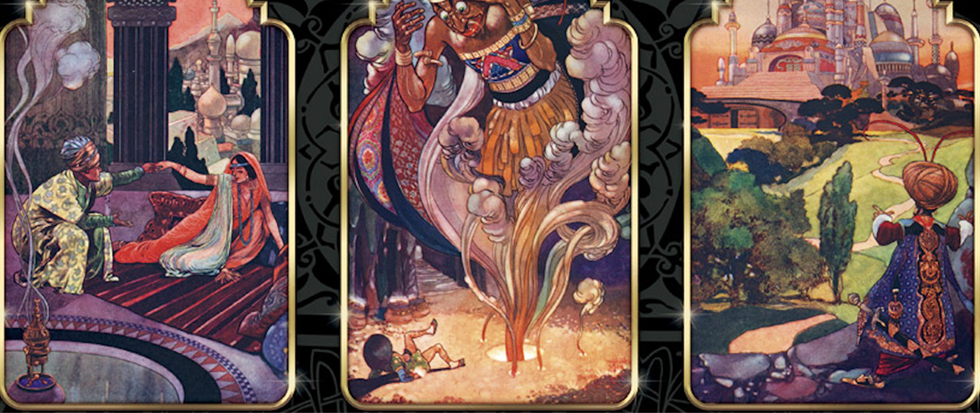
Your Story
Stories tend to emerge from games naturally as you and your friends weave a narrative through play. In Terraforming Mars, you’re competing to be the corporation that terraformed the barren planet the most, but in the process the game becomes a story about how every corporation worked in tandem to bring Mars to life. Games can tell explicit stories too, though, as we’ve seen from the bumper crop of plot-heavy games like Arkham Horror. There’s problems with this approach, as you start to feel like random things are happening at you instead of you forging a path of your own. But as Tales of the Arabian Nights shows, you just need to make each player feel like the hero of their own epic tales.
Unlike something like Arkham Horror, which thrusts you into random situations through encounter cards, Tales comes with an entire book of tales featuring 2000 different scenarios you can find yourself in. More recent games like Above and Below also use a book to augment and uplift a solid town-building game, but Tales is on a completely different level. Aside from the fact that Tales’ stories outnumber Above and Below’s by an extremely wide margin, there really isn’t much of a game beneath the mighty heft of the book. The game comes with a board, and you move around it completing quests, but the entire game hangs on the stories in the book and how you react to them.
That’s the key difference between Arkham Horror’s slot machine of happenings and Tales’ stories: The game gives you a measure of agency beyond rolling dice. When you encounter something, you get to choose how you respond to it through a table of appropriate verbs. You still don’t know how each encounter will work out in the end, but you gain ownership over these pre-determined outcomes because you chose them.

The biggest bit of magic that Tales brings, though, are the Status cards that you begin to accumulate as the game goes on. These cards alter the rules in some way for good or ill, but the big reason why they’re so amazing is because they make you feel like a dynamic character. Too often in games like this, you’re given a choice of several different premade characters that will get more powerful as the game goes on, but stay exactly the same narratively as when the game began. Any narrative that emerges comes from the player’s experience playing the game as opposed to being immersed in the game. In Tales, that experience is melded together thanks to cards like Scorned, Pursued, Blessed, Lost, Married, or even Vizier. As you gain and lose these cards, you begin to realize that your experiences start to form a character arc. You are a character in the mystical land of Arabian Nights. That’s a truly rare feeling from a board game.
Now I’d be remiss if I didn’t regale you with the best tale from my latest play session. I was traveling through Asia and stopped in a city I heard a rumor might have something worth my while. I encountered a Strange Custom there that I decided to Honor. It turns out that in that particular city, if one of the spouses in a married couple dies, the other one is buried alive in a tomb with them. Knowing this, I still met and fell in love with a woman there and married her. We were happy for the brief time that she was alive, but she fell suddenly ill and died a week later. Fearing death and not expecting to need to invoke the custom for some time, I attempted to flee the city, but was caught and beaten for dishonoring the practice. This beating Crippled me, preventing me from fleeing again. I was lowered into a tomb with my wife and a day’s worth of bread and water. Seemingly, my fate was sealed.
As it turns out, though, this particular tomb is a group burial site, meaning that the tomb would open again when they had to lower someone else down, and sure enough, someone else was lowered to their fate just as I was on the brink of starvation. Because of my Quick Thinking, I grabbed a leg bone of one of the many corpses in the tomb and killed the stranger, taking their food and prolonging my life long enough to find an exit somewhere in the catacombs, which I eventually did. But where I found myself shocked me, as I had found my way to the fabled Valley of Diamonds.
Eager to make the most of this opportunity, I formulated a plan to snag as many gems as I could before the Rocs, giant birds of legend, found me. I would then hide inside a corpse that merchants threw into the valley to distract the birds to ride out of it. My skills in the art of disguise, however, were lacking, and the merchants caught me and insisted that I pay for ferrying myself on their hard work. I gave them most of the gems I grabbed, but I managed to keep a little bit for myself. I managed to survive, a little wealthier and a little wiser for the experience.
My choices and experiences shaped that epic encounter, and forever changed the arc of my game. Tales of the Arabian Nights is bursting with turning points and epic encounters, and show the true power of storytelling in games.





